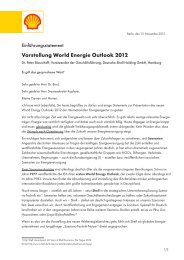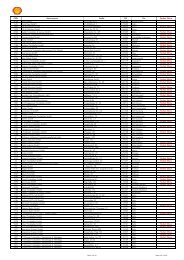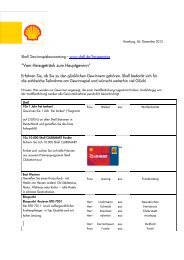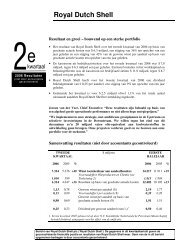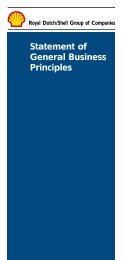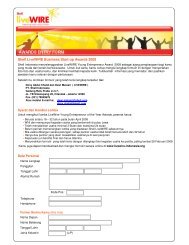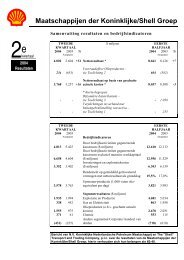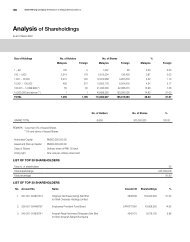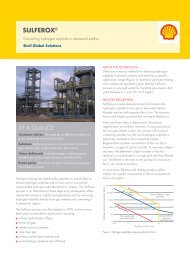competing fairly 5
competing fairly 5
competing fairly 5
Create successful ePaper yourself
Turn your PDF publications into a flip-book with our unique Google optimized e-Paper software.
Competing Fairly<br />
An Antitrust Primer for Shell staff
"Antitrust laws are the Magna Carta of free<br />
enterprise. They are as important to the preservation<br />
of economic freedom and our free-enterprise<br />
system as the Bill of Rights is to the<br />
protection of our fundamental<br />
personal freedoms."<br />
The Supreme Court, United States 1972<br />
"Cartels are cancers on the<br />
open market economy,<br />
which forms the very basis of our society".<br />
Mario Monti<br />
European Commissioner for Competition<br />
September 2000
Competing Fairly<br />
An Antitrust Primer<br />
for Shell staff<br />
Competing Fairly<br />
An Antitrust Primer for Shell staff<br />
Contents<br />
Section 1 The aims of antitrust law page 5<br />
Section 2 Defining the problem page 10<br />
Section 3 Dealing with dilemmas page 18<br />
Section 4 Maintaining business integrity page 20<br />
Appendices<br />
1 Cracking down on international cartels page 23<br />
2 Some commonly asked questions page 31
Competing Fairly<br />
An Antitrust Primer<br />
for Shell staff<br />
Section 1<br />
The aims of antitrust law<br />
The purpose of antitrust laws is to promote and safeguard competition and<br />
to punish anti-competitive behaviour.<br />
Competition between companies promotes innovation and ensures goods<br />
and services are produced as efficiently as possible, with efficiencies<br />
benefiting consumers in the form of lower prices or improvements in quality,<br />
choice or services. Without competition, the driving forces behind economic<br />
growth and employment would be lost. Competition provides businesses the<br />
opportunity to compete on price and quality, in an open market and on a<br />
level playing field, unhampered by anti-competitive restraints.<br />
The problem in perspective<br />
Collusion2 has been around for as long as people have been in business.<br />
That does not make it acceptable, nor is it a waste of time to try to do<br />
anything about it.<br />
Adam Smith said in his seminal text "The Wealth of Nations" back in 1776<br />
"people of the same trade seldom meet, even for merriment and diversion,<br />
without it ending in a conspiracy to raise prices".<br />
This tendency is of course driven by the possibility of increased profits<br />
following from collusion rather than competition. Shareholders, investors<br />
and analysts put businesses under considerable – and sometimes severe –<br />
pressure to perform and to maximise profits in order to survive in the long<br />
run.<br />
In truly competitive markets, competitors vie with one another to find the<br />
most efficient and least expensive way to respond to the demands of their<br />
customers.<br />
However, sometimes in situations of intense competition ("price wars"),<br />
profits can be low and deviation away from any form of profit maximisation<br />
may quickly lead to losses.<br />
2 The term "collusion" means unlawful cooperation between competitors to reduce or eliminate competition,<br />
such as price fixing and market sharing. Not all forms of cooperation between competitors are illegal and<br />
many forms of cooperation – such as joint ventures – are legal but may require approval by antitrust or other<br />
appropriate regulatory authorities. You should always seek legal advice if you are in any doubt.<br />
5
6<br />
Competing Fairly<br />
An Antitrust Primer<br />
for Shell staff<br />
There may be perceived economic incentives for companies to reduce<br />
the intensity of competition by cooperating with competitors to<br />
increase price in order to return to - or to secure - profitability or even<br />
to restore an "easy life". In addition, in some markets there can be a<br />
history of "close cooperation" between competitors, and there may be<br />
some (misplaced) concerns that in departing from the "club" we may<br />
be letting "our friends" in the industry down. However, collusion<br />
which distorts competition is not acceptable and, although it may be<br />
difficult to eliminate completely, much can and should be done to<br />
eliminate it.<br />
Collusion between competitors is enormously damaging in a variety of<br />
ways. Such behaviour distorts markets, damages economies and harms<br />
customers. Some studies suggest that collusion cost the world<br />
economies several billions of US dollars a year. 3<br />
Some Excuses<br />
Despite the serious economic damage that cartels, collusion and other<br />
anti-competitive practices cause, it is not uncommon to hear business<br />
people making excuses for it.<br />
For instance "it is part of their culture. We must not try to impose our<br />
standards on other countries".<br />
Collusion and anti-competitive practices may be more common in<br />
some parts of the world than others, and may be more common in<br />
some business areas than others, but we must not confuse bad practice<br />
with culture. If collusion and cartels were really an accepted - and<br />
lawful - part of a 'national culture', publication would also be normal<br />
and accepted, but most cartels and anti-competitive arrangements are<br />
conducted in secret, frequently with elaborate steps taken to hide the<br />
evidence.<br />
Collusion and anti-competitive practices may be more common in<br />
some parts of the world than others, but we must not confuse bad<br />
practice with culture.<br />
3 OECD Report on Hard Core Cartels, June 2000. The OECD defines a "Hard Core Cartel" as<br />
"an anti-competitive agreement, anti-competitive concerted practice or anti-competitive arrangement<br />
by competitors to fix prices, make rigged bids (collusive tendering), establish output restrictions or<br />
quotas, or share or divide markets by allocating customers, suppliers, territories or lines of commerce".
Competing Fairly<br />
An Antitrust Primer<br />
for Shell staff<br />
Or perhaps another excuse may be: "Others do it. If we do not, we will<br />
not be able to win any business against our competitors".<br />
It is, of course true that a refusal to engage in a cartel or other anticompetitive<br />
practice will sometimes lead to a loss of business, but there<br />
are also many customers who would prefer to deal with a company<br />
which has a strong "no collusion" and fair competition policy.<br />
International action against cartels<br />
In recent years antitrust authorities in several jurisdictions have<br />
toughened their stance against international cartels, and have<br />
committed enormous resources and efforts into "cartel busting". Some<br />
examples of cartels that have been broken up and prosecuted are given<br />
in Appendix 1. A common feature of these proceedings is the<br />
commitment of the authorities to seek out and stamp out antitrust<br />
violations, wherever they occur, irrespective of where the participants<br />
may be located.<br />
"It does not matter whether executives who engage in anti-competitive<br />
practices are citizens or foreign nationals … it is the Bureau’s policy to<br />
pursue the most senior executives involved in price fixing or market<br />
allocation cartels if their anti-competitive activity affects the market.<br />
We will go after them to the full extent of the law"<br />
Konrad von Finkenstein QC, Canadian Commissioner of Competition,<br />
commenting on the Vitamins cartel.<br />
There are now over 100 countries throughout the world with<br />
developed antitrust laws. A number of these make antitrust violation a<br />
criminal activity, with imprisonment of individuals and heavy<br />
financial penalties for the companies involved.<br />
Some financial penalties can be quite draconian: for example, a breach<br />
of European antitrust law can result in a fine of up to 10% of<br />
worldwide Group turnover.<br />
Antitrust laws apply where the economic effects of the agreement are<br />
felt, and not where the companies or employees are located, or where<br />
7
8<br />
Competing Fairly<br />
An Antitrust Primer<br />
for Shell staff<br />
the agreement happens to be made. So for example, if <strong>competing</strong><br />
companies based in Malaysia fixed the price of LNG going into the USA<br />
and Europe, it would be the antitrust laws of the US and Europe which<br />
would be relevant, despite the fact that the agreement was made in a<br />
country which does not have developed antitrust laws. It is therefore<br />
essential that Shell employees – wherever they are located – understand<br />
and observe the generally applicable principles of antitrust law.<br />
"These prosecutions should signal to business executives both in the<br />
USA and abroad that we will vigorously pursue companies and<br />
individuals involved in international cartels wherever they are. They<br />
had better take a hard look at their own behaviour, because they will<br />
pay a high price for their illegal actions."<br />
Joel Klein, Assistant Attorney General, US Department of Justice,<br />
commenting on the Lysine cartel.<br />
In addition, the OECD (Organisation for Economic Cooperation and<br />
Development) is coordinating an international drive between its<br />
member governments to crack down on international cartels. 4 The<br />
OECD condemns 'hard core' cartels such as price fixing, bid rigging<br />
(collusive tendering) and market sharing between competitors as the<br />
most serious violations of antitrust law, as they raise prices and restrict<br />
supply, thus making goods or services completely unavailable to some<br />
purchasers, and unnecessarily expensive for others.<br />
Proving the existence of a cartel depends largely on the antitrust<br />
authorities proving the existence of an agreement or meeting of minds<br />
(often called a "gentlemen’s agreement") between competitors. An<br />
explicit agreement can be demonstrated through direct evidence - a<br />
document that contains or refers to an agreement, minutes of a<br />
meeting that record an agreement among the attendees, or testimony<br />
by a person with knowledge of an agreement. But in some<br />
jurisdictions, an agreement also can be demonstrated by inference - a<br />
combination of circumstantial evidence, including the fact that<br />
competitors had a meeting before they implemented certain practices,<br />
records of telephone calls, and signalling behaviour - when one<br />
4 OECD Recommendation Concerning Hard Core Cartels [C(98)35/FINAL]
Competing Fairly<br />
An Antitrust Primer<br />
for Shell staff<br />
company tells another that it intends to raise prices by a certain<br />
amount. This evidence must show that a company’s conduct was<br />
more likely the result of an agreement than a unilateral action.<br />
Most antitrust authorities around the world have extensive powers to<br />
enter premises to search for evidence to prove that antitrust<br />
violations have occurred.<br />
9
10<br />
Competing Fairly<br />
An Antitrust Primer<br />
for Shell staff<br />
Section 2<br />
Defining the problem<br />
Antitrust laws apply to every level of business in the vast majority of<br />
countries in which Shell companies do business. These laws not only<br />
apply to Shell companies, but also to our competitors, suppliers and to<br />
our business customers. It is important to know about the laws - not<br />
only to avoid an infringement, but also to ensure that our suppliers or<br />
trade customers are not engaging in anti-competitive activities that<br />
could damage our business.<br />
The antitrust laws prohibit a variety of practices that restrain trade or<br />
restrict free and fair competition, such as price-fixing conspiracies and<br />
predatory acts designed to achieve or maintain monopoly power.<br />
Antitrust authorities throughout the world pursue violations of the<br />
antitrust laws vigorously. In many countries, infringements of antitrust<br />
laws can result in criminal prosecutions that can lead to imprisonment<br />
of individuals and large fines for both employees and the companies<br />
concerned.<br />
Rather than attempt to define every kind of anti-competitive practice<br />
to which Shell companies might be exposed, this Primer focuses on<br />
the most serious and clear-cut violations of antitrust law that<br />
undermine the competitive process and threaten Shell’s business.<br />
These are:<br />
■ price fixing between competitors<br />
■ market sharing between competitors<br />
■ agreements between competitors to restrict output<br />
■ collective boycotts<br />
■ abuses of market power by a monopolist or dominant firm<br />
Other potentially anti-competitive practices such as resale price<br />
maintenance are also briefly described. Of course laws relating to anticompetitive<br />
practices do differ from country to country, and<br />
employees are urged to seek legal advice on the antitrust laws relevant<br />
to the countries in which they do business.
Competing Fairly<br />
An Antitrust Primer<br />
for Shell staff<br />
Some cases involving antitrust violations are easier to identify than<br />
others are. Certain practices, such as price fixing between competitors,<br />
are so inherently harmful to customers that a detailed examination is<br />
not necessary to determine whether they are reasonable. In many<br />
countries, antitrust laws presume that price fixing and market sharing<br />
cartels are violations and condemn them almost automatically.<br />
Other practices demand closer scrutiny based on principles that the<br />
courts and antitrust agencies have developed to assess their impact on<br />
competition. A business practice within this latter category is illegal if<br />
it restricts competition in some significant way and has no overriding<br />
objective business justification or efficiency enhancing benefits.<br />
In some cases, a single company (or a small number of <strong>competing</strong><br />
companies) can acquire enough market power by organic growth to<br />
dominate a market. A dominant company has a special responsibility<br />
not to misuse its market power in a way that distorts fair competition.<br />
What business practices are unlawful?<br />
Agreements among competitors often raise antitrust suspicions. Not<br />
all relationships between competitors are necessarily illegal. The<br />
purpose of this Primer is not to deter employees from <strong>competing</strong><br />
<strong>fairly</strong> or from engaging in activities that do not restrict competition.<br />
However, certain activities do restrict competition and are<br />
generally illegal and we want to alert employees to the practices<br />
that commonly will infringe antitrust law.<br />
Examples of recent cartels and anti-competitive practices that<br />
have been prosecuted by antitrust authorities throughout the<br />
world are given in Appendix 1. These cartels not only resulted<br />
in very significant fines for the companies involved, but in<br />
several cases in the criminal prosecution of executives, resulting<br />
in personal fines and even imprisonment.<br />
11
12<br />
Competing Fairly<br />
An Antitrust Primer<br />
for Shell staff<br />
Agreements with competitors<br />
Price fixing agreements<br />
Agreements between competitors about the prices they will charge to<br />
customers or pay to suppliers for goods or services are generally<br />
amongst the most serious infringements of applicable antitrust rules.<br />
Understandings between competitors which have the effect of<br />
stabilising or raising prices or profit margins, agreements on price<br />
initiatives or price targets, price ranges or price recommendations, and<br />
agreements between competitors of "floor" or minimum prices are<br />
generally illegal under applicable antitrust laws. That is because price<br />
often is the principal way that firms compete. "Hard core" - clear or<br />
blatant - price-fixing between competitors is illegal and is subject to<br />
criminal prosecution in many countries. The antitrust prohibition on<br />
fixing prices also extends to agreements between competitors on pricerelated<br />
matters such as discounts, rebates, commissions and credit terms.<br />
Are similarity of prices, simultaneous price changes or high price<br />
indications of price-fixing? Not always. These conditions can result<br />
from price-fixing, but to prove the charge, antitrust authorities would<br />
need evidence of an agreement between competitors to fix prices.<br />
Systematic exchanges of pricing information between competitors can<br />
be used in many countries as evidence of a collusive agreement, and<br />
for that reason, great care needs to be exercised in relation to the<br />
exchange by competitors of competitively sensitive information. 5<br />
Price similarities - or the appearance of simultaneous changes in price -<br />
also can result from normal economic conditions and from a rational<br />
unilateral response by companies to those conditions. For example,<br />
vigorous competition can drive prices down to a common level. As for<br />
the appearance of uniformly "high" prices, collusion may not be the<br />
only basis for the situation. Prices may increase if consumer demand<br />
for a product is particularly high and the supply is limited. A general<br />
increase in wholesale gasoline costs due to production shortages can<br />
cause gasoline stations to increase retail prices around the same time.<br />
Provided the actions of the competitors are determined separately and<br />
5 Certain types of information exchange or information gathering are common and may indeed<br />
contribute to the competitive process provided they are undertaken with care and in compliance<br />
with the applicable antitrust laws. Guidelines on common forms of information exchange can<br />
be obtained from the Group’s specialist competition lawyers. See page 36 for details.
Competing Fairly<br />
An Antitrust Primer<br />
for Shell staff<br />
without collusion (and in the absence of a position of market<br />
dominance), there will be no infringement of applicable antitrust<br />
laws. But if prices are similar as a result of exchanges of information<br />
or pricing agreements between competitors, that is likely to be illegal<br />
under applicable antitrust laws.<br />
Red Flags You should be alerted to the danger of potential anticompetitive<br />
activity if anybody uses the following phrases in meetings<br />
or conversations:<br />
■ "No one will ever know"<br />
■ "That’s the way things are done round here"<br />
■ "It doesn’t matter how it is done, so long as it gets done"<br />
■ "We must all act together to restore an orderly market "<br />
■ "Everybody does it"<br />
■ "We didn’t have this conversation"<br />
■ "Don’t write this down"<br />
■ "No notes leave the room"<br />
Market division / Market sharing<br />
Agreements between competitors to divide sales territories or allocate<br />
customers - essentially, agreements not to compete - are generally<br />
illegal under most antitrust laws. Market sharing arrangements may<br />
take the form of agreements between competitors not to compete for<br />
certain customers or certain accounts, or not to compete in certain<br />
geographic areas. Clearly such non-compete agreements distort fair<br />
competition.<br />
For example, under applicable antitrust laws it would be illegal if<br />
competitors agreed that one of them would concentrate its sales<br />
activities in the Americas and another would concentrate its activities<br />
in Asia, and would not "poach" business from each other.<br />
Similarly, it would generally be illegal under applicable antitrust laws<br />
13
14<br />
Competing Fairly<br />
An Antitrust Primer<br />
for Shell staff<br />
for competitors to operate in "demarcated" territories, where the<br />
competitors agree not to challenge each other in their "home" market,<br />
or to "rig" contracts or tenders to ensure that they did not come into<br />
"head-to-head" competition.<br />
However, it is generally not illegal if a company comes to a unilateral<br />
decision not to pursue its business in certain locations or with certain<br />
types of customer. 6<br />
Agreements between competitors<br />
to restrict output<br />
An agreement between competitors to restrict production or output or<br />
to close production facilities is generally illegal under applicable<br />
antitrust laws because reducing the supply of a product or service<br />
inevitably drives up its price. So for example, it would generally be<br />
illegal under applicable antitrust laws for competitors to agree to<br />
rationalise their production facilities, to mothball units or to produce<br />
limited quotas of product.<br />
However, it is generally not illegal for a company to arrive at a<br />
unilateral decision to close production units or to reduce production<br />
output.<br />
Similarly it is generally not illegal for a company to agree to supply<br />
product to a competitor following the competitor’s decision to close a<br />
production facility. However, in this case, great care has to be taken to<br />
ensure that the competitor’s decision to close a facility was unilateral.<br />
So for example, the supplier should not make supplies of product<br />
conditional on the closure of the plant by the buyer.<br />
Collective Boycotts<br />
A collective boycott - an agreement between competitors not to deal<br />
with another person or business - generally violates antitrust law.<br />
Collective boycotts are agreements between competitors that they will<br />
not buy products or obtain services from a certain supplier, or<br />
agreements that they will not supply products or services to certain<br />
6 Antitrust laws often impose restrictions upon a dominant company’s ability to refuse to supply<br />
product even where such a decision is taken unilaterally.
Competing Fairly<br />
An Antitrust Primer<br />
for Shell staff<br />
customers. Such agreements are generally illegal under applicable<br />
antitrust laws. Clearly such agreements distort the competitive process<br />
by foreclosing the competitive opportunities of suppliers or by<br />
denying customer choice. Collective action amongst competitors to<br />
prevent a company from entering a market or to disadvantage a<br />
competitor also are generally illegal under applicable antitrust laws.<br />
Agreements with customers<br />
In some circumstances, certain customer restrictions may be anticompetitive,<br />
because for example, they may foreclose the competitive<br />
opportunity of <strong>competing</strong> suppliers, or restrict the competitive ability<br />
of the customer.<br />
The antitrust laws governing restrictive customer agreements do differ<br />
from country to country, and you should seek legal advice in advance<br />
on the acceptable parameters of your conduct. Examples of customer<br />
restrictions most commonly prohibited by antitrust laws are given<br />
below.<br />
Tie-in sales<br />
The sale of one product to a customer on condition that the customer<br />
purchases a second product, which it may not want or can buy<br />
elsewhere at a lower price, is known as a "tie-in". Requirements like<br />
these may be illegal under applicable antitrust laws if they harm<br />
competition (for example by significantly foreclosing the competitive<br />
opportunity of <strong>competing</strong> suppliers), so the competitive effects - and<br />
thus the legality - of such agreements have to be assessed carefully.<br />
Resale price maintenance agreements<br />
An agreement between a manufacturer (or supplier) and a dealer (or<br />
reseller) that fixes the minimum resale price of a product (i.e. the<br />
minimum price at which the product may be resold) is an<br />
infringement of antitrust law in many countries.<br />
Some antitrust laws, however, give manufacturers some latitude to<br />
adopt a policy regarding a recommended level of maximum resale<br />
prices. Agreements on maximum resale prices may not be<br />
15
16<br />
Competing Fairly<br />
An Antitrust Primer<br />
for Shell staff<br />
automatically illegal under applicable antitrust laws, in which case they<br />
need to be evaluated to assess their actual impact on competition.<br />
Indeed, a restriction on maximum resale prices may be beneficial to<br />
consumers in some situations, since they may prevent dealers from<br />
charging a non-competitively high price.<br />
Other anticompetitive agreements<br />
The examples highlighted above are not intended to give an exhaustive<br />
list of all types of potentially anti-competitive agreement, but simply<br />
to indicate the sorts of arrangement which are most commonly<br />
prohibited or controlled by applicable antitrust laws. You will clearly<br />
need to seek advice in your own jurisdiction on the locally applicable<br />
laws where any activity has an adverse impact on the normal<br />
competitive process.<br />
Abusing market power / dominance<br />
"Dominance" refers to a position of considerable economic power in a<br />
market held over a period of time.<br />
In relation to suppliers, "dominance" means that the relevant company<br />
has sufficient market power to restrict output and raise price above the<br />
level that would prevail in a competitive market, without existing<br />
rivals or new entrants taking away its customers. Buyers in a particular<br />
market may also have a position of considerable economic power, and<br />
are also subject to the prohibitions in antitrust law over abuse of<br />
market power.<br />
Dominance is not simply a question of a company having a large<br />
market share. Several factors have to be taken into account as well as<br />
market share, such as barriers to entry and the fragmentation of<br />
competitors’ market shares. 'Dominance' can only exist in relation to a<br />
particular product and geographic market. Market definition can often<br />
be a complex task. It involves an assessment of both law and<br />
economics, and should not be undertaken lightly.<br />
While it is generally not illegal to gain a position of market power<br />
(monopoly / dominance) in a market through organic growth, the<br />
antitrust laws generally make it unlawful to maintain or to abuse a<br />
monopoly through tactics that either unreasonably exclude firms from
Competing Fairly<br />
An Antitrust Primer<br />
for Shell staff<br />
the market or significantly impair the ability of others to compete.<br />
Because of its market power, a dominant company has a special<br />
responsibility not to act in a way that deliberately or un<strong>fairly</strong><br />
diminishes competition. Non-dominant companies are not subject to<br />
the antitrust prohibitions on unilateral abusive conduct but are of<br />
course subject to applicable antitrust laws controlling anticompetitive<br />
arrangements and agreements.<br />
A single dominant firm may commit a violation through its unilateral<br />
actions, or a violation may result if a group of firms together<br />
monopolise a market (collective dominance).<br />
Examples of conduct by dominant companies that may violate<br />
applicable antitrust laws include refusals to supply for non-objective<br />
reasons; unfair discrimination between equivalent transactions; nonobjective<br />
refusals to grant access to essential facilities; unfair or<br />
predatory pricing; engaging in practices to raise rivals’ costs or<br />
foreclose competitor entry, unfair rebating practices and customer ties.<br />
The types of conduct prohibited as "abuses" by dominant companies<br />
may differ from country to country, and if you believe that your<br />
business may be "dominant" or may be in a position of market power,<br />
you should seek legal advice in advance on the acceptable parameters<br />
of your conduct.<br />
17
18<br />
Competing Fairly<br />
An Antitrust Primer<br />
for Shell staff<br />
Section 3<br />
Dealing with dilemmas<br />
Anti-competitive behaviour is unacceptable. Whilst cartels between<br />
competitors that involve outright price fixing or market sharing are<br />
easy to identify and condemn, other anti-competitive practices may be<br />
less clear-cut.<br />
That is why trying to establish a set of rules that can be applied in<br />
every situation is difficult, if not impossible. Furthermore, it may be<br />
inadvisable, as it may encourage some people to look for loopholes and<br />
exceptions, which will not normally be available anyway.<br />
A better approach is to formulate a number of question as a starting<br />
points to analyse "grey areas". These questions aim to help employees<br />
distinguish between those activities which are acceptable and those<br />
which are not. Appendix 2 contains some commonly asked questions<br />
- based on situations encountered by Shell staff – together with some<br />
answers which are intended to stimulate thoughts about how certain problems<br />
may be approached and what principles should be taken into account.<br />
The application of antitrust laws is complicated by the fact that (with<br />
the exception of “hard core” cartel behaviour) many business practices<br />
can have an objectively reasonable business justification even if they<br />
limit competition in some way. 7<br />
Consider an agreement among <strong>competing</strong> manufacturers to adopt<br />
specifications / standards that require fire-resistant materials for certain<br />
products. The agreement to adopt the standard is restrictive: the<br />
manufacturers have limited their own ability to use other materials,<br />
and they have limited consumer choice. But the agreement to adopt<br />
the standard may benefit consumers in that it provides assurances of<br />
safety. What if manufacturers did not use a uniform standard for<br />
electrical outlets and plugs? The likely result would be<br />
incompatibilities between parts produced by different manufacturers.<br />
But because of the standard, parts manufactured by different<br />
companies become interchangeable, competition for the parts<br />
increases, and prices go down.<br />
7 In some jurisdictions, agreements which may restrict competition but which have countervailing<br />
efficiency (or other public benefits) may require notification to and approval by the relevant<br />
antitrust authorities. You should always seek legal advice if you are in doubt.
Competing Fairly<br />
An Antitrust Primer<br />
for Shell staff<br />
Non-price agreements between a manufacturer and a customer or<br />
dealer may also potentially restrict competition, but may be motivated<br />
by a desire to improve efficiency and reduce costs. Thus<br />
manufacturer-imposed limitations 8 on how or where a dealer may sell<br />
a product, e.g., service obligations or territorial limitations, have to be<br />
assessed for their effects on competition. These agreements may result<br />
in greater sales efforts and better service in the dealer’s assigned area,<br />
and more competition with other brands. On the other hand, some<br />
non-price restraints may be anticompetitive. For example, an exclusive<br />
dealing arrangement may prevent other manufacturers from obtaining<br />
enough access to sales outlets to be truly competitive. Or it might be<br />
a way for manufacturers to stop <strong>competing</strong> so hard against each other.<br />
The above examples demonstrate that it is by no means easy to<br />
condemn all potential "restrictions" as anti-competitive. This is why<br />
this Primer focuses on the types of arrangements between competitors<br />
that will almost certainly violate applicable antitrust laws, such as<br />
price fixing, market sharing and production limitation agreements.<br />
What should I do if I think a competitor is urging Shell to<br />
engage in unlawful activity?<br />
If you believe that a competitor is suggesting that a Shell company<br />
should fix prices, share markets or engage in any of the other<br />
unlawful business activities described above, you should disassociate<br />
Shell (and yourself) from the activity by leaving the meeting or<br />
terminating the conversation. You should then immediately make a<br />
note of your action and report the situation straight away to your line<br />
manager and to Legal Services.<br />
If you are in any doubt at all as to whether contact with a competitor<br />
would violate applicable antitrust law, you should seek Legal advice<br />
promptly before continuing with such contact.<br />
It is your responsibility to ensure that you have taken appropriate<br />
Legal advice and have taken the appropriate steps to disassociate Shell<br />
from any activities that would contravene applicable antitrust laws.<br />
8 Export bans which prevent or restrict exports or parallel imports of products from one Member<br />
State of the European Union to another within the EU are automatically illegal under European<br />
antitrust law.<br />
19
20<br />
Competing Fairly<br />
An Antitrust Primer<br />
for Shell staff<br />
Section 4<br />
Maintaining business integrity<br />
in Shell companies<br />
The Group's policy on business integrity is enshrined in the SGBP,<br />
which have been adopted by each company within the Group.<br />
The Group's stance on anti-competitive practices is unequivocal:<br />
"Shell companies support free enterprise. They seek to compete <strong>fairly</strong><br />
and ethically and within the framework of applicable competition<br />
laws; they will not prevent others from <strong>competing</strong> freely with them"<br />
(SGBP 8).<br />
Senior management commitment and involvement<br />
‘Tone at the top’ is crucial. Senior management should make a visible<br />
and active commitment to the SGBP and any local policies and<br />
procedures linked to them. They should make it clear to staff that any<br />
malpractice will be investigated and acted upon.<br />
Employees who voluntarily come to discuss antitrust concerns should<br />
not be criticised. They should feel free to discuss and resolve antitrust<br />
problems openly with Management and with Legal Services. 9<br />
Employees who comply with antitrust law should not feel that they<br />
have compromised their organisation if it turns out that the best legal<br />
solution involves extra cost or potential loss of business opportunities.<br />
The only concerns are where employees take steps to hide participation<br />
in an illegal cartel or anti-competitive practice. In this case, employees<br />
should know that disciplinary action will be taken against them.<br />
Antitrust Compliance Programme<br />
Group Legal Services has prepared and distributed a "Group" antitrust<br />
compliance package to operating company legal advisers. 10 Shell<br />
companies should develop their own Antitrust Compliance Programme<br />
9 In some countries in-house Legal Professional Privilege in respect of written documentation<br />
evidencing antitrust problems may be an issue. Employees should therefore be encouraged to discuss<br />
the issue orally with Management and Legal Services in the first instance.<br />
10 Copies of the Group Competition Compliance Package, which contains advice and<br />
recommendations on establishing an Antitrust Compliance Programme, can be obtained from the<br />
Competition Law Practice Group in Shell International Legal Services. See page 36 for details.
Competing Fairly<br />
An Antitrust Primer<br />
for Shell staff<br />
and strategies based on the Group package adapted to local<br />
requirements. An antitrust compliance strategy and training<br />
programme should embrace clear workable policies and procedures on<br />
the one hand, and a set of desired behaviours on the other. Both<br />
aspects are important. Good policies and procedures must be<br />
underpinned by the creation of an antitrust compliance culture<br />
within Shell companies – and extending where possible to joint<br />
venture companies.<br />
Training and awareness raising<br />
Training of staff who may potentially be exposed to antitrust risk (in<br />
particular those staff who have regular contact with competitors as<br />
part of their business activities) is a vital part of the Antitrust<br />
Compliance Programme. Procedures must be put in place to ensure<br />
that relevant employees receive regular training, and that appropriate<br />
training records are maintained.<br />
Assurance and auditing<br />
The Group Antitrust Compliance Programme contemplates that<br />
operating companies / units will send Letters of Assurance through<br />
appropriate channels in the Group Business organisations to verify<br />
what antitrust training has been conducted in the country / operating<br />
unit concerned. The operation of the compliance programme will be<br />
verified from time to time by “audits” conducted by members of Legal<br />
Services.<br />
Underpinning the overall strategy is the principle of<br />
transparency<br />
Where there is transparency, concerns can be reported and<br />
recorded, discussed, and improvements can be suggested. Without<br />
transparency, poor practices continue and may only come to light<br />
when a problem develops. Employees must be encouraged to raise<br />
concerns they have in relation to antitrust issues with their<br />
management and with internal legal advisers without fear. 11 Employees<br />
must, however, be warned that a failure to report involvement in<br />
cartels or other anti-competitive practices, and deliberate continuation<br />
of such practices by employees despite training will be viewed very<br />
seriously, and will result in disciplinary action up to and including<br />
dismissal.<br />
11 Employees should first raise the issue with internal legal advisers orally, in case in-house Legal<br />
Professional Privilege is a problem in the country concerned.<br />
21
Competing Fairly<br />
An Antitrust Primer<br />
for Shell staff<br />
22<br />
Communications channels 12<br />
Mechanisms should be in place for staff to report any concerns they<br />
may have in relation to dealings with competitors, whether this<br />
involves their own activity, activities of others within the<br />
company or approaches by third parties. These may include reports to<br />
line managers and Legal Service or auditors, depending on the nature<br />
of the activity. A number of Businesses (for example Oil Products and<br />
Chemicals) have appointed one or more "Compliance Focal Points"<br />
who can act as a confidential "hotline" as a means of raising concerns.<br />
Guarantees should be given to staff that they will not suffer if they<br />
report a violation of antitrust law (provided they have reported it<br />
immediately and have not taken steps to conceal it), nor if business is<br />
lost as a result of adhering to the provisions of the SGBP.<br />
Accountability<br />
Systems must be put in place to ensure that employees and, where<br />
appropriate, joint venture companies are held accountable for<br />
complying with the spirit and letter of the business integrity provisions<br />
of the SGBP. These may include making adherence to the SGBP<br />
business integrity provisions part of staff performance assessments,<br />
establishing processes for identifying and resolving antitrust issues, and<br />
establishing disciplinary procedures for when deliberate violations<br />
occur.<br />
12 Some countries have introduced legislation on "Whistle-blowing". The UK’s Public Interest<br />
Disclosure Act, for instance, is designed to protect whistle-blowers from victimisation by employers<br />
should they wish to raise concerns in good faith. That Act directs an employee, in most cases, to raise<br />
concerns with the employer in the first place, and where the employer has an internal whistleblowing<br />
procedure, to use that.
Competing Fairly<br />
An Antitrust Primer<br />
for Shell staff<br />
Appendix 1<br />
Cracking down on international cartels<br />
The International Vitamins Cartel<br />
Seven companies in the global vitamins business carved up the world<br />
vitamins markets between themselves, increased, fixed and maintained<br />
world prices of different vitamins, allocated sales quotas and exchanged<br />
customer and market share data. The cartel was so long standing – lasting<br />
almost a decade from 1989 to 1999 – and entrenched that conspirators<br />
themselves referred to it as "Vitamins Inc". Proceedings were taken against<br />
the cartel members in the USA, Europe, Canada and Australia.<br />
The price of collusion<br />
Hoffmann-La-Roche of Switzerland<br />
- The company was fined US$500 million, €462 million,<br />
Can$48 million, and Aus$15 million;<br />
- 3 senior executives (including the President of HLR’s<br />
Vitamins and Fine Chemicals division) were sentenced to<br />
jail in the USA for terms up to 5 months and personally<br />
fined a total of US$ 600,000.<br />
- 2 of these senior executives were also personally fined a<br />
total of Can$ 425,000<br />
BASF of Germany<br />
- The company was fined €296.2 million; US$225 million,<br />
Can$ 19 million and Aus$ 7.5 million;<br />
- 3 senior executives (including the President of BASF’s Fine<br />
Chemicals division) were imprisoned for terms up to 4<br />
months in the USA.<br />
Others<br />
- In addition other US, Swiss, Japanese and Canadian<br />
companies were fined a total of € 97.1 million in Europe,<br />
US$ 150,000 in the USA, and Can $ 27.32 million<br />
- The Vice President of Chinook of Toronto was sentenced<br />
under Canadian law to serve a 9 month prison sentence<br />
and 50 hours of Community service for participating in<br />
the cartel relating to vitamin B4 (choline chloride)<br />
23
Competing Fairly<br />
An Antitrust Primer<br />
for Shell staff<br />
24<br />
Commentary on the Vitamins cartel<br />
"The Antitrust Division has now prosecuted firms on three<br />
Continents, demonstrating again our resolve to punish illegal cartel<br />
conspiracies regardless of the location of the conspirators".<br />
US DOJ Antitrust Division’s Deputy Attorney General Gary Spratling,<br />
May 1999<br />
"This is the most damaging cartel the EU Commission has ever<br />
investigated. The companies’ collusive behaviour enabled them to charge<br />
higher prices than if the full forces of competition had been at play,<br />
damaging consumers and allowing the companies to pocket illicit profits".<br />
Mario Monti, EU Commissioner for Competition November 2001.<br />
The International Lysine Cartel<br />
Lysine is an essential amino acid used in animal feed. In mid 1991,<br />
Archer Daniel Midland (ADM) entered into the Lysine market.<br />
ADM’s production doubled the global Lysine production capacity, but<br />
ADM signalled to the competition that it would prefer to achieve a<br />
global market position by market coordination rather than a price war.<br />
Regular meetings took place from mid 1992 through to 1995 in Asia,<br />
the Americas and Europe, at which global Lysine prices were fixed and<br />
market share quotas agreed, using a trade association as a "cover" for<br />
their illegal activities. A mechanism to "police" the cartel was also<br />
agreed, with a compensation mechanism for cheating on the cartel.<br />
ADM told the others that they had to be very careful, and should take<br />
precautions to disguise the fact that they were meeting.<br />
However, unknown to the other cartel members (including ADM),<br />
one of the executives of ADM had been cooperating with the US<br />
Federal Bureau of Investigation from as early as November 1992, and<br />
the FBI had been undertaking a covert surveillance operation. The<br />
FBI operation included the secret filming of some of the cartel<br />
meetings, as well as the monitoring of telephone calls. In 1995, the<br />
FBI raided the offices of the American based companies, and shortly<br />
afterwards, Ajinomoto (a Japanese conspirator) "blew the whistle" on<br />
the cartel by reporting it to the EU Commission. Antitrust actions<br />
were subsequently brought against the cartel members in the USA,<br />
Canada and Europe.
Competing Fairly<br />
An Antitrust Primer<br />
for Shell staff<br />
The price of collusion<br />
ADM of the USA:<br />
- Fined US $70 million, € 47.3 million and<br />
Can$ 14 million;<br />
- Three ADM senior executives were indicted and sent to jail<br />
in the USA and had personal fines imposed upon them of<br />
US$ 350,000 each;<br />
- ADM settled consolidated US civil class law suits and has<br />
paid additional damages (of a significant but unspecified<br />
amount);<br />
- ADM also had to settle shareholder actions brought<br />
against it as a direct result of the antitrust suits.<br />
Others (Ajinomoto and Kyowa of Japan; Sewon<br />
and Cheil of Korea):<br />
- Fined a total of € 53.7 million, US$30.2 million,<br />
and Can$ 4.2 million.<br />
- Personal fines were imposed on the Japanese and Korean<br />
executives totalling US$200,000.<br />
- The Managing Director of Ajinomoto was indicted in the<br />
USA, but failed to appear at his trial and is still a fugitive.<br />
Commentary on the Lysine cartel<br />
"These prosecutions should signal to business executives both in the<br />
USA and abroad that we will vigorously pursue companies and<br />
individuals involved in international cartels wherever they are. They<br />
had better take a hard look at their own behaviour, because they<br />
will pay a high price for their illegal actions."<br />
Joel Klein, Assistant Attorney General, US Department of Justice<br />
25
Competing Fairly<br />
An Antitrust Primer<br />
for Shell staff<br />
26<br />
The Graphite Electrodes Cartel<br />
Graphite electrodes are used in steel milling. The cartel lasted for<br />
around 7 years. The competitors met in the US, Far East and Europe,<br />
and increased, maintained and fixed prices and eliminated discounts.<br />
They allocated sales volumes and divided the world market between<br />
themselves on a region-by-region basis. They also agreed to reduce<br />
production capacity and exchange sensitive sales and customer<br />
information. The companies held regular meetings, including at CEO<br />
level (dubbed the "Top Guy" meetings).<br />
They knew they were infringing antitrust law, and took great pains to<br />
conceal meetings. Hotel and travel expenses were paid in cash with<br />
no explicit references to the producer meetings, and in all documents,<br />
code names were used for the cartel members.<br />
The worldwide investigation into this cartel was prompted by a<br />
"whistle-blowing" conspirator taking advantage of antitrust amnesty<br />
programmes in the US and EU. The cartel was investigated by<br />
authorities in the US, EU, Canada and Japan.<br />
The price of collusion<br />
SGL of Germany:<br />
- Fined US$135 million; € 80.2 million; and Can$12.5 million;<br />
- A German senior executive was fined US$10 million<br />
(the largest personal fine on an individual in US<br />
antitrust history)<br />
UCAR of the USA:<br />
- Fined US$110 million; € 50.4 million; and Can$11million<br />
- Two senior executives were committed to prison in the USA<br />
with jail terms of up to 17 months, and were also personally<br />
fined more than US $1 million each.<br />
Others (Showa Denko and Tokai Carbon both of Japan)<br />
- Fined a total of US$38.5 million, € 88.2 million; and<br />
Can$ 2.25 million
Competing Fairly<br />
An Antitrust Primer<br />
for Shell staff<br />
Commentary on The Graphite Electrodes Cartel<br />
"This Decision is a further signal that the EU Commission will<br />
apply the full force of the law to hard core cartels. At the same time,<br />
granting a very substantial reduction in Showa Denko’s fine<br />
(reduced by 70%) shows that the Commission takes proper account<br />
of a company’s cooperation in uncovering illicit cartels"<br />
Mario Monti, EU Commissioner for Competition November 2001<br />
"This case should send a strong message to other executives that<br />
participation in cartels will not be tolerated and will result in severe<br />
penalties. Those currently engaged in or contemplating similar<br />
conduct should take note of the high cost of getting caught."<br />
Joel Klein, Assistant Attorney General, US Department of Justice<br />
The Citric Acid Cartel<br />
This cartel was uncovered during investigations into the Lysine cartel.<br />
The conspirators had regular meetings where they agreed to fix prices<br />
and allocate sales volumes worldwide. They also agreed a sophisticated<br />
system to monitor and enforce the cartel. High level executives would<br />
meet in secret where they agreed the broad terms of the cartel<br />
(dubbed by the conspirators the "Masters’ meetings") and lower<br />
ranking employees (so-called "Sherpa meetings") were left to work out<br />
the details and implement the agreements<br />
The price of collusion<br />
Hoffman-La-Roche of Switzerland<br />
- The company was fined € 63.5 million; US$14 million;<br />
and Can$2.9 million<br />
- A senior HLR executive was personally fined Can$75,000<br />
for his part in the cartel.<br />
ADM of the USA<br />
- Fined € 39.7 million, US$30 million; and Can$2 million.<br />
Bayer of Germany<br />
- Fined US$50 million, and € 14.22 million;<br />
- Senior German executive personally fined US$150,000.<br />
27
Competing Fairly<br />
An Antitrust Primer<br />
for Shell staff<br />
28<br />
Others (Jungbunzlauer of Switzerland and Cerestar of The<br />
Netherlands)<br />
- Fined a total of US$24.4 million; and € 17.8 million<br />
- 3 executives (2 Swiss and 1 Italian) personally fined a total<br />
of US$340,000.<br />
Commentary on the Citric Acid cartel<br />
"As with the Vitamins cartel, the behaviour of Hoffmann-La-Roche,<br />
ADM and the others shows a disregard for their customers and,<br />
ultimately, the consumers who paid more for the products than if the<br />
companies had engaged in healthy price competition.<br />
I am confident that the message is now being clearly received.<br />
Companies must by now be fully aware of the risks they are taking<br />
should they be tempted to collude".<br />
Mario Monti, EU Commissioner for Competition December 2001.<br />
The Oil Rig Transportation Cartel<br />
The members of the cartel agreed to allocate customers and contracts<br />
and fix prices for heavy-lift derrick barges and other transport<br />
equipment used in the oil and gas industry. They originally targeted<br />
oil and gas construction contracts in the UK and Norwegian North<br />
Sea, but extended their anti-competitive agreement to the Gulf of<br />
Mexico and the Far East. The case was prosecuted in the USA. As at<br />
March 2002, there was no reported Decision from the EU on the case.<br />
The price of collusion<br />
Heeremac of the Netherlands:<br />
- Fined US$49 million; Dutch executive personally<br />
fined US$100,000<br />
Dockwise of Belgium<br />
- Fines of US$16 million were imposed on Dockwise<br />
- Personal fines totalling US$ 225,000 were imposed on<br />
Dutch employees of Dockwise.
Competing Fairly<br />
An Antitrust Primer<br />
for Shell staff<br />
The Sodium Gluconate Cartel<br />
Sodium Gluconate is an industrial cleaning chemical. The cartel lasted<br />
8 years until 1995. The competitors in the industry held regular<br />
meetings in four Continents, where they agreed on sales quotas, fixed<br />
"minimum" and "target" prices and shared out customers. Adherence<br />
to the cartel was carefully monitored, and the parties observed a rule<br />
whereby if one of them sold over their quota in one year, its sales quota<br />
for the following year was reduced accordingly.<br />
The price of collusion<br />
Akzo Nobel (Dutch company)<br />
- Fined a total of US$10 million; and € 12.6 million;<br />
Can$700,000<br />
- Two Dutch executives of Akzo Nobel were personally<br />
fined US$100,000 each.<br />
Fujisawa (Japanese company)<br />
- Fined US$20 million; € 3.6 million (their EU fine was<br />
reduced from € 18 million for "blowing the whistle" under<br />
the EU leniency programme); and Can$360,000;<br />
- A Japanese executive of Fujisawa was personally fined<br />
US $ 200,000<br />
Roquette (French company)<br />
- Fined € 10.8 million; US$ 2.5 million and Can$ 700,000<br />
- French executive of Roquette was personally fined<br />
US $ 50,000<br />
Archer Daniel Midland (US company)<br />
- Fined € 10.2 million<br />
Jungbunzlauer (Swiss company)<br />
- Fined € 20.4 million<br />
29
Competing Fairly<br />
An Antitrust Primer<br />
for Shell staff<br />
30<br />
Commentary on the Sodium Gluconate Cartel<br />
"This Decision is again proof that the EU Commission is determined<br />
to uncover and punish hard-core cartels, which are the worst kind of<br />
violation of the competition rules."<br />
Mario Monti, EU Commissioner for Competition October 2001<br />
"These cases strongly demonstrate the US DOJ’s priority to prosecute<br />
international white-collar and corporate crimes and to protect<br />
American consumers from paying the price of collusion"<br />
Joel Klein, Assistant Attorney General, US Department of Justice
Competing Fairly<br />
An Antitrust Primer<br />
for Shell staff<br />
Appendix 2<br />
Some commonly asked questions<br />
Question 1 Does the prohibition on price fixing and other agreements<br />
that distort competition mean that Shell companies cannot exchange<br />
information or agree market strategy with another Shell company?<br />
Answer 1 No. Antitrust laws generally only apply to<br />
arrangements between economically independent entities, so that<br />
agreements or exchanges of information between companies that are<br />
wholly owned, or solely controlled, within the Royal Dutch / Shell<br />
Group generally will not be prohibited by antitrust law.<br />
Question 2 Do antitrust laws apply to arrangements between Shell<br />
companies and joint ventures in which Shell has a shareholding?<br />
Answer 2 As a general rule, companies in which Shell has a<br />
shareholding, but which are not solely controlled by Shell (for<br />
example, because other shareholders have important veto rights), are<br />
not part of the "Shell single economic entity" for antitrust purposes.<br />
Thus antitrust law could in principle apply to anti-competitive<br />
arrangements between Shell companies and Shell joint ventures.<br />
Question 3 Does this mean that the Shell shareholder is restricted in the<br />
sort of information it can obtain from the joint venture?<br />
Answer 3 As a general rule, it is legitimate for a shareholder<br />
to obtain any information from its joint ventures in order to protect<br />
its investment and to manage its portfolio. However, the shareholder<br />
is generally restricted by applicable antitrust laws from acting as a<br />
"conduit" for the exchange of competitively sensitive information to<br />
<strong>competing</strong> Shell companies and/or joint ventures. The application<br />
of the antitrust rules to joint venture relationships can be complex,<br />
and you are urged to seek legal advice if this is relevant to you.<br />
31
Competing Fairly<br />
An Antitrust Primer<br />
for Shell staff<br />
32<br />
Question 4 Does the Shell shareholder in a joint venture have liability if the<br />
joint venture violates antitrust law?<br />
Answer 4 The general rule in most jurisdictions is that the<br />
shareholder would only incur liability for the acts of a joint venture /<br />
company in which it has a minority interest if the shareholder<br />
representative was aware of the violation, and supported it or<br />
knowingly ignored it. However, the laws on liability for antitrust<br />
violations do differ from country to country, and thus you are advised<br />
to seek local legal advice on this issue.<br />
Question 5 Are there circumstances where I could be personally liable for<br />
antitrust violations by the company?<br />
Answer 5 Yes. Many countries make antitrust violation a<br />
criminal offence, and impose prison sentences and personal fines on<br />
employees taking part in the infringement.<br />
Question 6 I understand that the antitrust authorities can investigate<br />
company premises for evidence of antitrust violations – are there any<br />
circumstances where they could investigate the homes of individuals?<br />
Answer 6 Yes. Many antitrust authorities have the right to<br />
conduct investigations at private premises if they have reasonable<br />
grounds to believe that evidence of antitrust violations may be kept or<br />
concealed there. You should seek legal advice locally on this issue.
Competing Fairly<br />
An Antitrust Primer<br />
for Shell staff<br />
Question 7 OPEC (The Organisation of Petroleum Exporting Countries)<br />
is often called a "cartel" – isn’t OPEC illegal in that case?<br />
Answer 7 Antitrust laws generally only apply to entities engaged in<br />
trade (e.g. private and public companies, sole traders, partnerships and<br />
even to state owned companies). The antitrust laws generally do not apply<br />
to the actions of Governments acting in their Sovereign capacity. Since<br />
OPEC is an organisation of Governments, it is unlikely to contravene<br />
applicable antitrust laws. However, if the activities carried out by OPEC<br />
(e.g. production limitation agreements) were carried out by companies<br />
rather than Governments, such activities would infringe<br />
antitrust law.<br />
Question 8 The country in which I operate has not yet adopted any<br />
antitrust laws. Does this mean that I can ignore all this?<br />
Answer 8 No. Antitrust laws apply where any commercial activities<br />
have their economic effect. Thus, if you were selling product or providing<br />
services into a country or jurisdiction that does have antitrust laws, you<br />
would have to comply with the antitrust laws of that country. More and<br />
more countries are adopting antitrust laws, so awareness of the principles<br />
of antitrust laws is important.<br />
Not only that, but you should bear in mind that the SGBP states that<br />
Shell companies will seek to compete <strong>fairly</strong> and ethically in their<br />
businesses. This does not necessarily mean that the full vigour of general<br />
antitrust principles applying in countries with antitrust laws will have to<br />
be observed in countries with no antitrust laws. However, activities such<br />
as price fixing and collective boycotts are inconsistent with the SGBP<br />
which states that Shell companies will compete <strong>fairly</strong> and ethically.<br />
33
34<br />
Competing Fairly<br />
An Antitrust Primer<br />
for Shell staff<br />
Question 9 I understand that exchanges of competitively sensitive<br />
information may lead to an antitrust infringement, and in some<br />
jurisdictions may even constitute an infringement of itself. Does this mean<br />
that I cannot engage in benchmarking or in collecting competitive<br />
intelligence?<br />
Answer 9 No, it does not mean that. In fact, collecting competitive<br />
intelligence ("CI") can be part of a normal competitive market, and not<br />
anti-competitive at all. However, you will have to take certain<br />
precautionary measures to ensure that the benchmarking or CI exercise<br />
does not infringe competition law. For example, with benchmarking, the<br />
information exchanged should be aggregated and historic, and should not<br />
include any pricing information. It may be advisable to hire an<br />
independent third party (such as a consultant) to aggregate data and to<br />
ensure that no competitively sensitive data is exchanged.<br />
With CI gathering, clearly if this is from public sources and independents<br />
such as consultants, there should generally be little or no antitrust risk.<br />
This is generally also true of information obtained from customers. Great<br />
care has to be taken, however, with any information obtained from<br />
competitors, and any systematic exchange of information with<br />
competitors – whether it is part of CI gathering or otherwise – should<br />
receive a legal "health check".<br />
Question 10 If an exchange of market sensitive information between<br />
competitors is an antitrust problem, can I get round this by using an<br />
intermediary such as a consultant, trade publication or trade association<br />
to "signal" to my competitors?<br />
Answer 10 The general answer is that where competitors knowingly<br />
use a third party intermediary as an "information broker" for the<br />
exchange of competitively sensitive information (e.g. the next quarterly<br />
pricing increase), that will not avoid the application of the antitrust rules.<br />
Using third parties to "signal" market intentions to competitors is a<br />
dangerous practice from the antitrust point of view, and you should seek<br />
legal advice promptly.
Competing Fairly<br />
An Antitrust Primer<br />
for Shell staff<br />
Question 11 If Shell enters into corporate negotiations (for example, to establish<br />
a joint venture or acquire a business), we will need to exchange or receive<br />
confidential market information in order to conduct a valuation and due<br />
diligence. Does antitrust law restrict or prohibit this?<br />
Answer 11 Antitrust law considerations are relevant to such<br />
exchanges of information, because until the moment the deal has<br />
received any necessary antitrust approvals and has been completed, the<br />
parties should remain as competitors in the market. The Competition<br />
Law Practice Group in Shell International Legal Services has produced<br />
standard "Rules of Engagement" which should be used in such<br />
circumstances to minimise antitrust exposure. See page 36 for details.<br />
Question 12 My competitors can often be my customers (for example, in<br />
supply deals, trading, product swaps etc.) so I have to discuss price in<br />
order to do the deal. How does antitrust law apply to that situation?<br />
Answer 12 Antitrust law is primarily aimed at preventing collusive<br />
behaviour between competitors. Clearly there will be situations where<br />
your competitor may be a customer and you should generally be able to<br />
conclude business deals in such circumstances without infringing<br />
applicable antitrust law. It is important in such circumstances to limit<br />
any information exchange strictly to the transaction under consideration,<br />
and not to use such deals as a "cover" for further cooperation /<br />
agreements which may have the effect of restricting competition. Any<br />
systematic contacts with competitors can be sensitive from the antitrust<br />
point of view, and you should seek legal advice if you are concerned<br />
about this.<br />
35
36<br />
Competing Fairly<br />
An Antitrust Primer<br />
for Shell staff<br />
Further Information<br />
Legal Advice on antitrust issues in your country should be<br />
sought in the first instance from your local Shell lawyers.<br />
Further information about issues raised in this Primer may also<br />
be obtained from the Group’s specialist antitrust lawyers in the<br />
Competition Law Practice Group.<br />
The members of this Group are:<br />
Anne Riley (Anne.A.Riley@SI.Shell.com)<br />
Chuck Corddry (CWCorddry@Shell.com)<br />
Joanne Taylor (Joanne.J.Taylor@SI.Shell.com)<br />
Gerrit Vriezen (Gerrit.G.Vriezen@SI.Shell.com)<br />
The companies in which Royal Dutch Petroleum Company and The "Shell" Transport and Trading Company, p.l.c.<br />
directly or indirectly own investments are separate and distinct entities. In this publication, the expressions "Royal<br />
Dutch/Shell Group" and "Group" are used to refer to the companies in the Royal/Dutch/Shell Group as a whole. The<br />
word "Shell" may be used in some places to refer to the Group and in others to refer to an individual Shell company or<br />
companies.<br />
© Shell International Limited (SI) 2002. Permission should be sought from SI before any part of this publication is<br />
reproduced. This document is for the use and guidance of employees of companies within the Royal Dutch/Shell Group<br />
only. Designed and produced by SI Legal Services, London.
Produced by Shell Visual Media Services 04/04/02 44797 25m


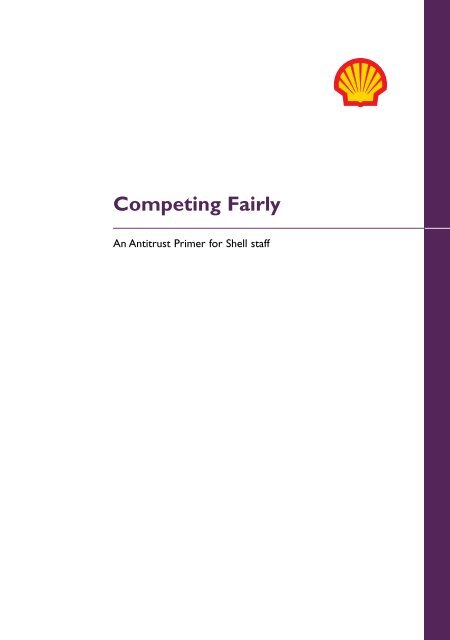

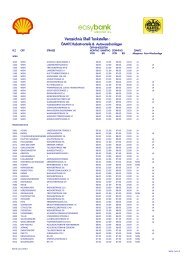
![Download Shell AutoGas Stationen [Stand: Januar 2013] (PDF](https://img.yumpu.com/9982753/1/190x245/download-shell-autogas-stationen-stand-januar-2013-pdf.jpg?quality=85)

